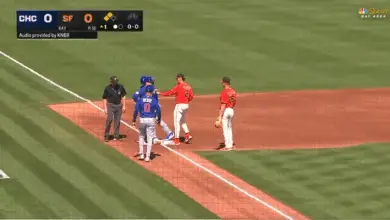
Small Ball Yields Big Results as Baseball Gods Finally Favor Cubs
There are still more naysayers than the combined total of Cubs hits and Mets gaffes Wednesday night, but it’s becoming apparent that fortunes have begun to shift on the North Side. Even taking into account the frustrating continuation of offensive tropes that have been around for years now, the erly lack of hitting defied all manner of logic. So the Cubs didn’t necessarily need to re-write their whole book, they just needed to correct a few typos and maybe add a chapter or two.
That got started in the series opener against the Mets, a relatively pedestrian affair in which the Cubs managed to plate three runs on just four hits while striking out 12 times. Maybe they still need a few edits after all. In any case, they managed to do just enough to manufacture three runs while somehow limiting the Mets to a single tally.
“That was a really well-played game,” David Ross said afterwards. “I thought we pitched really well…It was nice picking up some of those insurance runs with the quality at-bats in the fourth. Really nice team win all the way around.”
A pessimist might chalk that all up to luck and an interesting strike zone from home plate umpire John Libka, who helped Mets starter Taijuan Walker live up to his name. But if luck is truly what happens when preparation meets opportunity, you could argue the Cubs were simply overdue in taking advantage.
“The expected wOBA, all of the good stuff, looks really good,” Ian Happ told reporters prior to Wednesday’s explosion. “All the metrics — fly ball rates, walk rates, hard-hit percentage, barrel percentage — all that stuff looks really good. So, you’ve got to trust the process, and trust the baseball gods.
“It’s a long season. They’re going to be good to me at some point. Maybe sacrifice a few chickens here.”
For those who aren’t entirely familiar with the measurements Happ is referencing, they are merely indicators of what should really be happening based on the kind of contact being created. In short, hitting the ball hard is more likely to result in a hit. We all know there are plenty of duck snorts and seeing-eye singles sneaking through while scalded at ’em balls find gloves, but the latter will win out over time.
In the Cubs’ case, though, it wasn’t necessarily a matter of collectively hitting the ball hard and failing to find favor with the baseball gods. Those fickle deities are wont to help those who help themselves and neither Happ nor the rest of the team had been doing much to curry favor.
A week ago, the Cubs were dead last in baseball with a .198 BABIP and a 58 wRC+ was 58, neither of which is even close to good. While the former does indicate a great deal of misfortune, it’s also a sign that the Cubs simply weren’t hitting the ball well. Sure enough, their 30% hard contact (per FanGraphs) was 19th in MLB and their 19.4% soft contact was higher than all but three other teams.
Heading into Wednesday’s explosion, the Cubs were all the way up to a .227 BABIP that was still last in baseball and 81 wRC+ that had surpassed the Rockies (66). After racking up 13 hits, only one of which left the yard, that BABIP jumped to .244 and their wRC+ is at 88.
More than just a fluke, the Cubs have increased their hard contact to 32.7% (11th in MLB) while decreasing their soft contact to 15.5% (9th lowest). That’s a dramatic turnaround in the space of a week and it speaks to the dangers of attempting to define a team just a few games into the season. Are the Cubs going to suddenly become the Dodgers here? Doubtful, but they don’t figure to fall back into being the worst-hitting team in franchise history.
Javier Báez was responsible for that big blast, the sixth grand slam of his career that came after the Mets opted to walk Anthony Rizzo to load the bases for a man who’s been swinging through fastballs in the zone at an alarming rate. Javy had struck out four times the previous game and he’s been missing fastballs right down the middle, so you can see why the Mets might have thought he was easy prey.
Or you can see why he was due. Ross said after the game that Javy has been working on mechanical adjustments to correct his timing and, though the manager declined to offer specifics, he said we’ll “see glimpses” moving forward. A glimpse was just about all we got of the blast that headed out to left in a hurry, then Javy turned around to bat lefty his next time up with a double-digit lead and a position player on the mound.
That slam was the highlight, but the real story of the game was the Cubs making Chili Davis simmer in the opposing dugout by putting together the kind of performance he wasn’t able to coax from them in his time as the hitting coach. Sometimes all it takes is one game like that to remind players that they can win by inflicting a thousand paper cuts rather than by trying land a mighty clout with a broadsword or battle axe.
“It was nice. Quality at-bats,” Ross opined after the win. “I don’t know if we’ve had that many singles in quite some time. It feels like the things we’ve seen over the last four or five days have been really good and paid off.”
With the meatloaf now out of the oven and resting, perhaps the Cubs can relax a bit and settle into a more sustainable approach that sees them blending small ball with the homer-dependent nature that isn’t just going to vanish overnight.

